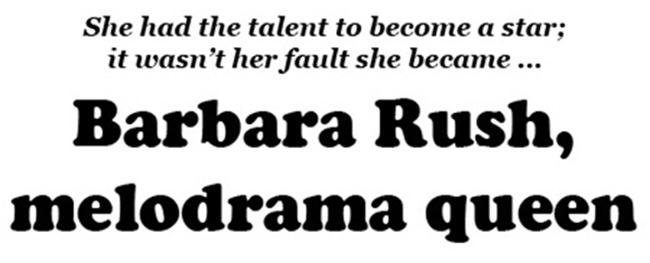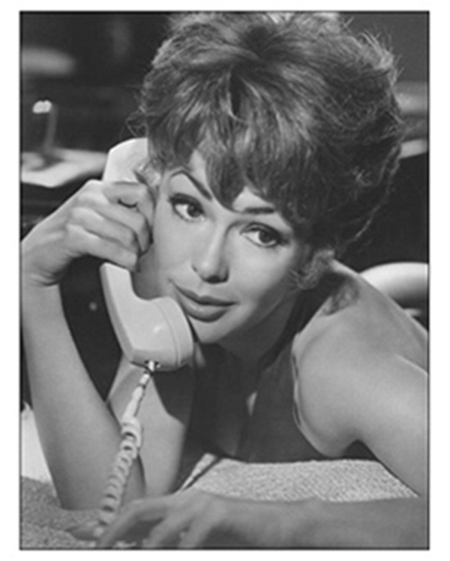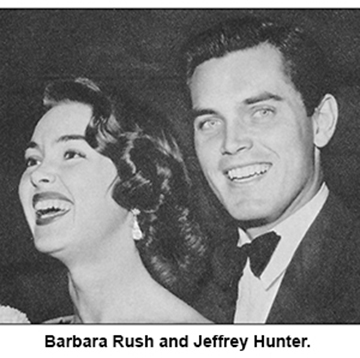November 21, 1965, Akron Beacon Journal
By JACK MAJOR
Barbara Rush thought a moment, then chuckled. It was a you-won’t-believe-this-but-it’s-true chuckle.
“Hollywood must be the most moral place in the world,” she said. “I’ve been here 15 years and I’ve never been invited to an orgy.”
Our conversation had strayed into morality moments before when we talked about the suburban housewife, a role Rush often plays. (In fact, many believe barbararush is a noun meaning “weepy-eyed suburban housewife whose husband has run off with Kim Novak.)
I hate suburban housewives,” Rush declared. “At least, I hate the kind I play. Actually, I’ve never met one ... so what I really hate is Hollywood’s conception of the suburban housewife.
“I keep hearing about all the wild things that are going on ... the husband and wife swapping and all that ... but I’ve never encountered it.
“It’s not happening here,” she said, sounding serious. “Maybe it’s all going on in Akron.”
And she chuckled again. This time it was a “you-probably-didn’t-think-I-remembered-what-newspaper-you-work-for chuckle. Touche.
Barbara Rush can been seen Tuesday night playing a very special wife in the conclusion of a two-part episode on “The Fugitive.” Her husband in the episode is Lt. Gerard, the sinister-looking policeman who is all the time hunting that cute Richard Kimble.
“No, I don’t fall in love with Kimble like all the other girls do,” Rush promised, “but I do try to keep him around. Mrs. Gerard figures the sooner Kimble is captured, the sooner her husband will spend time at home with her and their son. It’s getting to be a drag ... the way he drops everything to chase around the country after Kimble.”
Then – and this I performed as a public service, friends – I asked her about the widespread rumor that Gerard is really the guy who killed Kimble’s wife.
“Oh, I see that story has reached your part of the country,” she said. “It all started with a paperback book that had nothing to do with ‘The Fugitive,’ but which used names of characters in the show. The book named Gerard as the killer.”
Rush said that contrary to popular belief –NO! A final episode of “The Fugitive” has not been filmed. Not even David Janssen, Richard Kimble himself, knows how his show will finish.
“But I doubt that they’d name Gerard as the killer,” said Rush. “For one thing, so many people now expect it.”
The two-parter on “The Fugitive” is Rush’s first project since her own series fell through.
“Last year at this time my program was considered a sure starter for the 1965-66 season. CBS had it penciled in on their schedule for Mondays at 9:30.
“But then Jim Aubrey – he was still in charge of the network – decided he didn’t want the show, and General Foods, who owned the program, got uppity and said that was all right because Aubrey couldn’t have it even if he wanted it.
“Well, Aubrey was fired a few days later, but by the time General Foods got around to offering the show to CBS again, the network had already purchased ‘Hazel’ for my time spot.”
Rush’s pilot film eventually was aired an episode of the “CBS Vacation Playhouse,” a collection of rejected series ideas.
If you’ve ever wondered how such ideas are born. Rush has an answer, at least, for her show.
“It grew out of a survey that indicated there are many women working to put their husbands through school. Someone in Hollywood thought it a clever idea to do a show about one such wife.
Rush would have been the mother of three who did secretarial work at home in order to put her husband through medical school. Strange? Ah, yes, but television works in mysterious ways.
Why, you might ask, would Rush’s character work at home?
“Because of the children,” she said. “You must have children in a TV series; I don’t know why. It’s just a must.” And with children in the home, Rush couldn’t very well work somewhere else.
You might also wonder why this program’s married couple would be in their 30s instead of within the usual college age bracket – 18 to 24, say.”
Well, such a young couple wouldn’t have children old enough for a TV-style family. Hollywood likes their children to be at least seven years old. They’ll take ‘em younger, but good actors in the four, five and six-year-old range are hard to find.
“And they tell me every family must also have a dog,” said Rush, “but I put my foot down on that one. I figured three kids were enough to have around the house”
Then she laughed. “However, I might have to eat my words,” she said. “I just received a script for another series in which I’d play a veterinarian.”
Barbara Rush will keep reading pilot scripts because she wants to have her own series, but she wished television could find another method of selecting programs.
“Pilot films are so unfair. They always stress the situation, not the characters. Yet when the show gets on the air, it’s the characters that count, not the situation.
“The object is to get a bland format, then create pleasing personalities ... the kinds of people that families all over the country want to have in the house.”
Rush feels she can be this kind of person, although most of her roles have shown her as an elegant, fragile lady that few women like or identify with.
“As soon as I arrived in Hollywood, people labeled me another Olivia deHavilland, and from then on I was given roles as elegant ladies. And I appear fragile because I’m skinny.
Rush sees herself as something else. “I think I’m funny,” she said. “One of my favorite roles was in ‘Come Blow Your Horn.’ I certainly wasn’t fragile in that picture.”
Indeed she wasn’t. She was a sophisticated, sarcastic marriage-minded nightclub singer who finally induced Frank Sinatra to propose.
Rush’s career has followed a path typical of actresses who began in the 1950s, that wonderful Piper Laurie-Tony Curtis era.
Although given a tremendous amount of exposure, Barbara Rush has never made it big. Much of the reason lies in the fact women make the stars, and women just aren’t interested in watching other women. Even Olivia deHavilland might have a more difficult time breaking through these days.
Rush, perhaps more than any actress, has discovered how hard it is for a woman to become Big Box Office.
One of her early movies was “Taza, Son of Cochise,” and her co-star was another young unknown, Rock Hudson.
She later did “The Young Philadelphians,” and shared billing with Paul Newman.
Next she starred in “The Bramble Bush” with Richard Burton when he was little more than a pock-faced Welshman with more potential than popularity.
In all three movies it was the leading man who caught on; Barbara didn’t.
And if being a woman hasn’t hurt her career enough, rush has further restricted it with a rule that she won’t work outside of Los Angeles. “And you know most films these days are shot on location.”
Rush remains in her home city so she can be with her four children and her husband, publicist Warren Cowan.
This determination to be a good wife and mother places her outside the mainstream of Hollywood’s professional activity, and its social activity, as well.
Maybe that’s why she hasn’t been invited to any orgies. |



 of the Rogers and Cowan publicity firm. Their daughter, Claudia Cowan, is a journalist with Fox News.
of the Rogers and Cowan publicity firm. Their daughter, Claudia Cowan, is a journalist with Fox News.